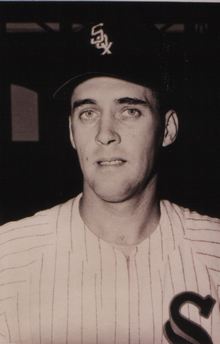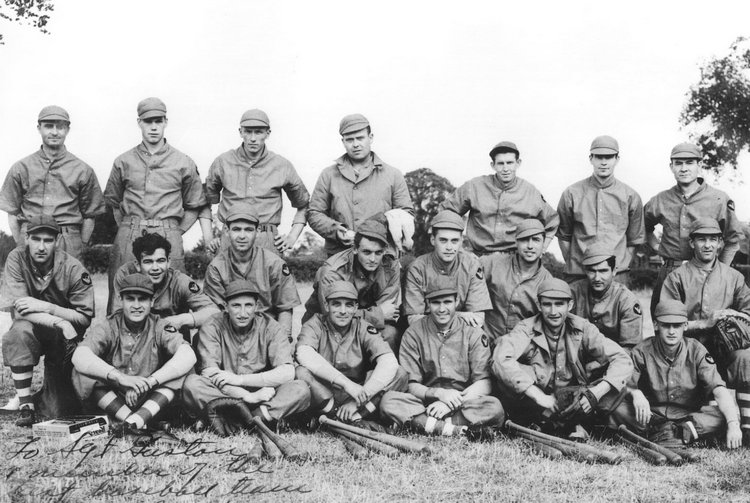

Ross Grimsley
Date and Place of Birth: June 4, 1922 near Americus, Kansas
Died:
February 6, 1994 Memphis, Tennessee
Baseball Experience: Major League
Position: Pitcher
Rank: Corporal
Military Unit: Signal Battalion, VIII Bomber Command, USAAF
Area Served: European Theater of Operations
Major League Stats: Ross Grimsley on Baseball-Almanac
 Ross A
Grimsley was born near Americus in the Wheeler neighborhood, Kansas
on June 4, 1922. He graduated from Americus High School in 1941 and
pitched for the Independence Indians in the semi-pro Southeastern
Kansas Ban Johnson League during the summer.
Ross A
Grimsley was born near Americus in the Wheeler neighborhood, Kansas
on June 4, 1922. He graduated from Americus High School in 1941 and
pitched for the Independence Indians in the semi-pro Southeastern
Kansas Ban Johnson League during the summer.
Aged 20, the lefthander entered military service in October 1942. He served with the Army Air Force as a corporal and arrived in England in early 1943. As part of a signal battalion at VIII Bomber Command Headquarters in High Wycombe, Grimsley pitched for the Bomber Command Bombers throughout the war years. During one spell in 1943, he struck out 86 batters in seven games. Grimsley also played for an Eighth Air Force team of former professional players that played an all-pro Army team at London’s Wembley Stadium. The Air Force team defeated the Army 1-0 on the no-hit pitching of Bill Brech and then embarked on a 30-day tour of military camps throughout Great Britain. The team would play during the day and travel in the evening. Because the blackout in Britain at this time caused virtually zero visibility they often had to have someone in front of the vehicle to show the way. The team – which was coached by former Senators' pitcher Monte Weaver and featured Red Sox first baseman Paul Campbell – finished the tour with a 29-1 record. Lieutenant-General Ira C Eaker later said this was “the best baseball team I have ever seen.”
Grimsley often wrote home while in England, telling about the
miserable weather but also about sleeping between fresh sheets in a
private house, getting a couple of fresh eggs each week and regular
trips to the university city of Oxford. Grimsley met his future wife
in England - Judy Robinson of Lima, Ohio - who was serving as a
WAAC. They married
in Jacksonville,
Florida on September 17, 1948.
 |
| The Eighth Air Force All-Stars in England, 1943. (Grimsley is middle row, fifth left) |
Grimsley spent the last months of the war at Bad Kissingen in Germany with the Ninth Air Force and returned home in January 1946, Grimsley began his professional career with the independent Chanute Athletics of the Class D Kansas-Oklahoma-Missouri League where he was the strike out king with 295 whiffs and led the league with 18 wins and a 1.93 ERA in 196 innings. He was 19-9 with the Topeka Owls of the Class C Western Association in 1947 and led the league with 262 strike outs.
Grimsley was purchased by the St Louis Cardinals at the close of the 1947 season and assigned to the Houston Buffaloes in the Texas League for 1948. He pitched just five games at Houston but with the Columbus Cardinals in the South Atlantic League he pitched 30 games for a 6-14 won-loss record. He was back with Houston for a brief stint in 1949 and was 14-9 with the Winston-Salem Cardinals for the rest of the year. Back with Columbus in 1950, the 28-year-old was 12-7.
In December 1950, Grimsley was drafted by the Brooklyn Dodgers. For the first time in his career Grimsley's role became that of a relief pitcher in 1951 and he recorded a 4-1 record in 26 appearances with the Montreal Royals in the International League. He had an ERA of 4.37 and performed well enough for White Sox scout Eddie Taylor to recommend the Chicago team purchase the lefthander. "General Manager Frank C Lane of the Chicago White Sox today announced the purchase of left handed pitcher Ross Grimsley from Montreal of the International League for an undisclosed sum of cash," declared a White Sox press release dated August 30, 1951. "White Sox scout Eddie Taylor has seen Grimsley in action a half-dozen times during the past two weeks and recommended him as a good relief hurler."
On August 30, 1951, he joined the Chicago White Sox. He made his first major league appearance on September 3, in the first game of a double header at Cleveland. Grimsley was called in with the bases loaded and none away, but after giving up a two-run single to the first batter he went on to give up only one more run before being relieved for a pinch hitter in the sixth. In all he walked six, struck out two, and gave up five hits in his four innings of pitching.
Grimsley made a total of seven relief appearances with the White Sox that season, appearing in 14 innings with a 3.86 ERA. In October he pitched in a major league exhibition game in Topeka, Kansas before going on to visit with his parents in Americus. Grimsley's brief major league career had come to an end.
He pitched for the Memphis Chicks in the Southern Association in 1952 and 1953, the Charleston Senators of the American Association in 1954, Charleston, Omaha and Nashville in 1955, and Omaha again at the beginning of 1956. Later in the season he joined the Toronto Maple Leafs in the International League and remained with the Canadian team until joining the Louisville Colonels of the American Association in 1958.
Grimsley ended his professional baseball career with the Birmingham Barons of the Southern Association in 1960 - the 38-year-old pitching a whopping 58 games for a 6-1 record and 3.08 ERA.
With his playing career over, Grimsley went to work for the
Dupont
Corporation in Memphis, Tennessee. Twenty years after his brief
appearance with the White Sox, his son, Ross II, broke into the
majors with the Reds. Ross Grimsley II went on to pitch for the
Orioles and Expos, winning 20 games with Montreal in 1978.
Ross Grimsley underwent open heart surgery in December 1993. He suffered a fatal heart attack at his home in Memphis, Tennessee on February 6, 1994. He was 71 years old and is buried at Wood Haven Cemetery in Millington, Tennessee.
Thanks to Dale Grimsley for help with this biography.
Created May 3, 2006. Updated January 11, 2008.
Copyright © 2015 Gary Bedingfield (Baseball in Wartime). All Rights Reserved.